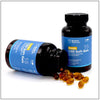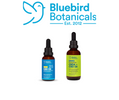Bluebird Botanicals Glossary of CBD Terms

Hemp is a plant with a prosperous and storied past. But, while hemp has found itself as a power player dating as far back as Mesopotamia, the language of hemp has often been misused to stoke fear or misinformation about the plant. Alongside historical misnomers, the hottest cannabinoid in town - CBD - brings with it a host of new vocabulary as research into its impact on health and wellness becomes more widespread. Let’s not mince words and we’ll get right to it! Read on to discover the rich world of cannabis vocabulary in Bluebird Botanicals Glossary of CBD Terms.
A
Agonist: Any chemical or substance that triggers a physiological response when it binds with a receptor.
Amino acids: Organic compounds that combine to form proteins and can be used as a source of energy by the body.
Antagonist: Any chemical or substance that blocks or inhibits the action of an agonist when it interacts with a receptor.
Antioxidants: Antioxidants are natural components of foods that are able to remove free radicals from the body. Antioxidants are present in many of the natural ingredients used in Bluebird Botanicals products, like hemp seed oil.
C
Cannabinoids: A class of naturally occurring molecules primarily found in the cannabis plant.
Carboxyl group: An organic functional group that consists of a carbon atom double-bonded to an oxygen atom and single bonded to a hydroxyl group.
CBD: CBD stands for cannabidiol, one of the most abundant cannabinoids found in the cannabis plant that has been well studied for its effect on humans.
CBDA: Stands for cannabidiolic acid, which is the raw or acidic form of CBD. CBDA is derived from CBG and converts to CBD as it is exposed to light and heat.
CBD Isolate: Cannabidiol in its purest crystalline form. CBD isolate consists of 99+% pure CBD and it is a fine white powder.
CBG: CBG stands for cannabigerol. Often referred to as the "mother cannabinoid," CBG is the first cannabinoid that the plant produces during its life cycle. All of the other cannabinoids are created from of CBG.
CBN: CBN stands for cannabinol and is one of the cannabinoids found in cannabis. CBN is actually derived from THC, but unlike its parent, induces little to no psychoactive effects. THC converts to CBN over time as it is exposed to light and heat.
cGMP: Current Good Manufacturing Practices. These are regulations enforced by the FDA for food and supplement manufacturers to verify manufacturing best practices. Bluebird Botanicals has received its certification of compliance from Eurofins Scientific, a world-renowned laboratory testing organization.
CO2 extraction: This is an extraction method commonly used in the supplement industry. The CO2 extraction method uses high pressures to convert CO2 gas to a polar liquid, which draws the plant’s components out of the source material. Because this method uses only CO2 gas, it is considered one of the safest ways to extract cannabinoids.
Cultivars: This is the botanically correct term for what is usually known as “strain” in the marijuana world. Cultivars are plant varieties from within one species that are selectively cultivated to maintain certain characteristics.
D
Decarboxylation: The chemical process that removes a carboxyl group from a molecule and releases carbon dioxide (CO2). This typically refers to a reaction of carboxylic acids that results in the removal of a carbon atom from a carbon chain.
E
Emulsion: Where a liquid containing tiny droplets of another liquid without forming a solution, or a mixture of two liquids that can’t be completely blended together. For example, in Bluebird’s Hemp Classic blend, our full-spectrum hemp extract is emulsified in organic virgin hemp seed oil.
Endocannabinoid system: A biological system found in all mammals that involves lipid neurotransmitters and cannabinoid receptors found in the brain and body. After its discovery in the early 1990s, a large body of scientific research has found that the endocannabinoid system is closely involved with the human neural, hormonal, and immune systems.
Endocannabinoids: Cannabinoids produced in the brain and body of any organism with a spinal column. When they discovered the first cannabinoid neurotransmitter in 1992, the team led by Dr. Raphael Mechoulam decided to use the Sanskrit word for bliss and named it anandamide (AEA).
Entourage effect: The entourage effect describes the synergy of all of the cannabinoids, terpenes, flavonoids, ketones, and other components of the cannabis plant that work together for good. Essentially, the whole cannabis plant is greater than the sum of its parts.
Ethanol extraction: An extraction method that utilizes ethanol as a solvent to strip cannabinoids and terpenes from the cannabis plant. The solution is then heated to burn away any residual ethanol left over from the extraction process.
F
Flavonoids: Flavonoids are a group of natural substances found in fruits, vegetables, grains, bark, roots, stems, teas, and wine. They play a variety of biological roles in plants, including providing flavor and aroma as well as attracting pollinators.
Fractionated Coconut Oil (MCT): Fractionated coconut oil is an oil produced from regular coconut oil. It is a great source of medium-chain triglycerides (MCTs), which are fats that are easy for the human body to process.
Full-spectrum hemp extract: A full-spectrum hemp extract describes a product with the entire array of 100+ cannabinoids found in the cannabis plant, plus the additional range of beneficial compounds like terpenes, flavonoids, fatty acids, etc. It utilizes a much larger part of the plant versus isolate products that single out only one compound of the cannabis plant, such as CBD.
H
Heavy metals: This refers to metal elements of relatively high density, or of high relative atomic weight that are naturally present in the earth’s soil. Heavy metals include iron, lead, and graphite. Crops can often absorb these metals during cultivation and, if undetected, may show up in final products that consumers use. However, third-party lab testing is usually able to detect trace elements of heavy metals.
Hemp seed oil: An oil made from hemp seeds that does not contain any cannabinoids. Hemp seed oil is beneficial for general wellness due to its ideal ratio of omega-3 fatty acids to omega-6 fatty acids, which are responsible in part for proper cell, muscle, and organ function.
Hemp: A cannabis plant with high levels of CBD and low levels of THC.
High-Pressure Liquid Chromatography (HPLC): A technique in analytical chemistry used to separate, identify, and quantify each component in a mixture. It relies on pumps to pass a pressurized liquid solvent containing the sample mixture through a column filled with a solid adsorbent material. Each component in the sample interacts slightly differently with the adsorbent material, causing different flow rates for the different components and leading to the separation of the components as they flow out of the column.
Homeostasis: Homeostasis is the state of steady internal physical and chemical conditions maintained by living systems.
M
Marijuana: A cannabis plant with high levels of THC and low levels of CBD.
Microbial life: A generic term for all microscopic, including bacteria and protists. Bluebird Botanicals provides testing for microorganisms such as yeast, mold, E. coli, and aerobic bacteria.
Mycotoxins: A toxic secondary metabolite compound produced by organisms of the fungus kingdom that is capable of causing both disease and death in humans and other animals. Bluebird Botanicals tests for mycotoxins as part of its quality assurance system to ensure that our products are mycotoxin-free.
N
Nuclear Magnetic Resonance (NMR): An analytical chemistry technique used in quality control and research for determining the content and purity of the sample as well as its molecular structure.
O
Omega Fatty Acids: A group of dietary polyunsaturated fats that cannot be manufactured by the body. They play many important roles in the body and are used primarily for energy. It is important to maintain the correct balance of omega 3, omega 6, and omega 9 fatty acids.
P
Phytocannabinoids: Cannabinoids produced within a plant such as cannabis and also found in a few other species such as echinacea, radula, black pepper, and even chocolate (cocoa).
R
Residual solvents: Solvents are organic volatile chemicals, typically liquids, that are often used during hemp extraction to separate compounds from inert plant matter. These solvents are most often ethanol and butane and are evaporated from the product after extraction. However, leftover solvents can occasionally be found present in the final product.
Rick Simpson Hemp Oil: Rick Simpson Hemp Oil (RSHO) is a super potent THC oil made from marijuana plants. Some people find it quite helpful for overall wellness, but the high levels of psychoactivity can be a problem for others. Also, RSHO tends to contain less of the other cannabinoids like CBD. Bluebird Botanicals' hemp extracts contain only minor levels of THC because they are made from hemp cannabis as opposed to marijuana.
S
Steam distillation: An extraction method that uses high-pressure steam to separate compounds from inert plant matter. In regards to hemp extractions, these compounds include cannabinoids, terpenes, and flavonoids, although the high temperatures often damage the cannabinoids, making it a more preferable extraction method for terpenes and flavonoids.
Synthetic cannabinoids: A series of cannabinoids produced in laboratories based on the blueprint of the cannabinoids found in the plant and in vertebrates. They are used to probe and study the endocannabinoid system to better understand how it works.
T
Terpenes: The primary constituent of many essential oils found in plants like cannabis. Terpenes are what give cannabis and other plants their distinct smell and flavor.
THC: Delta-9 tetrahydrocannabinol, or THC, is the cannabinoid found in cannabis that gets users “high.” It is a partial agonist of the CB1 and CB2 receptors in humans.
W
Winterization: Winterization is a process that uses a solvent and cold temperatures to separate lipids and other desired oil compounds from waxes.
Still have questions about CBD? Check out our free guide, Finding Success with CBD, to learn more.
Bluebird’s Customer Care Team is always here for you. Email info@BluebirdBotanicals.com to get in touch with a real human who can help.










